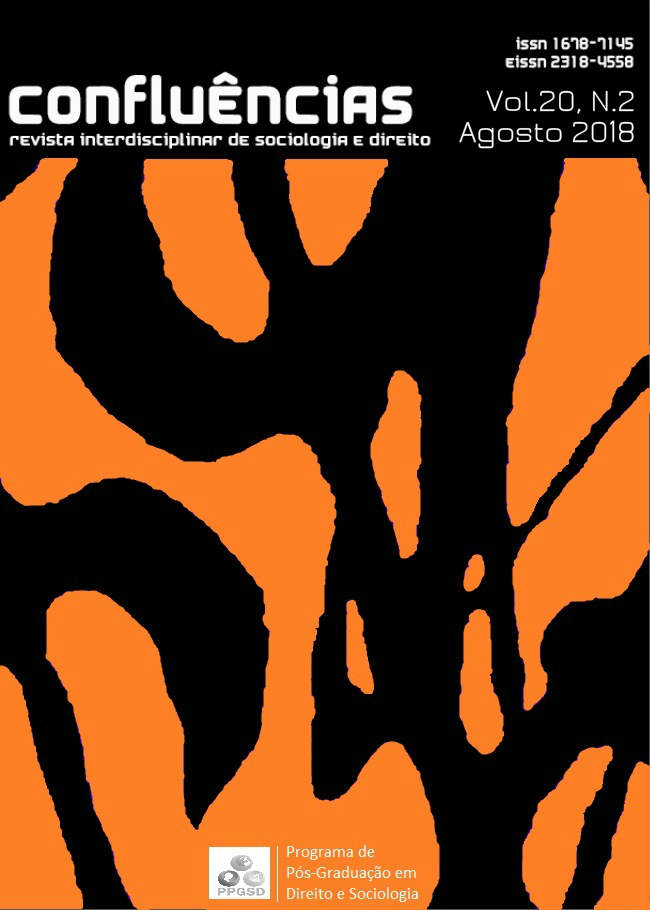BRAZILIAN URBAN POLICY AND THE CRITICAL IDEA OF URBAN REFORM INTRODUCED IN THE 1988 CONSTITUTION
DOI:
https://doi.org/10.22409/conflu20i2.p546Keywords:
City, Urban Reform, City StatuteAbstract
The brazilian urban policy before 1964 was not national in character. It was episodic and municipal initiative. In 1962, the government João Goulart elaborated the Triennial Plan; this plan was the first in the country to set macroeconomic objectives and to serve as an instrument for a global economic policy. In 1963 and in line with the idea of an urban reform of João Goulart indicated in the Triennial Plan, a group of architects points out the need for a critical urban policy. This initiative is interrupted by the coup d’état of 1964, which proposes and implements its own urban policy. With the constituent in 1987, the National Movement for Urban Reform presents a critical and diverse reflection of the policies applied in Brazil until the 1988 Constitution. A new legal framework was proposed and approved and a new institutionalization was implanted, seeking greater justice social and citizen participation. Despite the advances, many limits have appeared in the last thirty years and the conjuncture after 2016 is hostile to a distributive urban policy. This article proposes to analyze critically the urban policy that was implanted after the Constitution of 1988, also considering the policies that took place before.Downloads
References
AQUINO, Eneida Mara Moraes Zanella. A Política Urbana no Brasil pós-64. São Paulo: dissertação de mestrado, datilografado, 1990.
BASSUL, José Roberto. “Estatuto da cidade: a construção de uma lei”. In: CARVALHO, Celso Santos, ROSSBACH, Anaclaudia (Org). O Estatuto da Cidade: comentado - The City Statute of Brazil : a commentary. São Paulo: Ministério das Cidades/ Aliança das Cidades, 2010.
BERMAN, Marshal. Tudo que é solido desmancha no ar: a aventura da modernidade. São Paulo: Companhia das Letras, 1998.
BRASIL. Estatuto da Cidade. Brasília: Câmara de Deputados. Coordenação de publicações.2001. Disponível em http://www2.camara.leg.br/atividade-legislativa/comissoes/comissoes-permanentes/cdu/part.html/estatutodacidade. Acesso em 01 de março de 2018.
FONDATION LE CORBUSIER. Carta pessoal de Renato Almeida para Le Corbusier. Document E1 – 1, Rio de Janeiro, 4 abril de 1930.
GRAZIA, Grazia de. “Estatuto da Cidade: uma longa história com vitórias e derrotas”. In: OSÓRIO, Letícia Marques (org.). Estatuto da Cidade e reforma urbana: novas perspectivas para as cidades brasileiras. Porto Alegre: Sergio Antônio Fabris, 2002.
LEME, Maria Cristina da Silva "O Plano de Avenidas e a formação do pensamento urbanístico em São Paulo nas primeiras décadas do século XX", p. 69-76 In : FERNANDES, Ana e GOMES, Marco Aurélio A. de F. Seminário de História Urbana. Salvador: UFBA/Faculdade de Arquitetura; ANPUR, 1992.
LIRA, R. “Entre o legal e o ilegal: direito à cidade”. In: RIBEIRO, A.; VAZ, L. e SILVA, M. Leituras da cidade. Rio de Janeiro: Letra Capital: ANPUR. 2012, pp. 144-156.
PEREIRA, Elson (org). Alegoria da Participação: planos diretores participativos pós-Estatuto da Cidade. Florianópolis: Insular, 2015.
PEREIRA, Elson e PERRIN, Mathieu. ”Le droit à la ville. Cheminements géographique et épistémologique (France – Brésil – International) ”. L'information géographique - Vol. 75,1, 2011.
PEREIRA, Elson. Histoire d’un outil d’amenagement: le zonage. L’exemple d’une ville brésilienne. Tese de doutorado. Grenoble, 1999.
SANTOS Jr. Orlando. “Cidade, cidadania e planejamento urbano: desafios na perspectiva da reforma urbana”. In: FELDMAN, Sarah; FERNANDES, Ana (orgs.). O urbano e o regional no Brasil contemporâneo: mutações, tensões, desafios. Salvador: EDUFBA, 2007. pp. 293-314.







